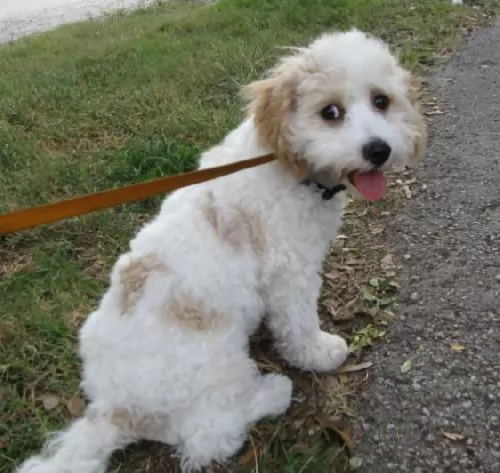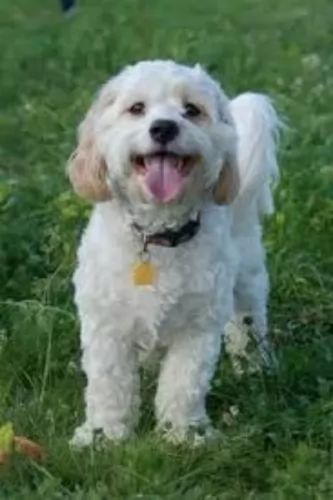 Petzlover
Petzlover Cavachon is originated from United States but West Siberian Laika is originated from Russia. Cavachon may grow 28 cm / 11 inches shorter than West Siberian Laika. Cavachon may weigh 13 kg / 28 pounds lesser than West Siberian Laika. Both Cavachon and West Siberian Laika has almost same life span. Cavachon may have less litter size than West Siberian Laika. Cavachon requires Moderate Maintenance. But West Siberian Laika requires Low Maintenance
Cavachon is originated from United States but West Siberian Laika is originated from Russia. Cavachon may grow 28 cm / 11 inches shorter than West Siberian Laika. Cavachon may weigh 13 kg / 28 pounds lesser than West Siberian Laika. Both Cavachon and West Siberian Laika has almost same life span. Cavachon may have less litter size than West Siberian Laika. Cavachon requires Moderate Maintenance. But West Siberian Laika requires Low Maintenance
 The Cavachon dog is a mix of the Bichon Frise and a Cavalier King Charles Spaniel. There isn’t much on the history of the dog but it seems as though certain kennels in Berryville, Virginia, in the United States are the first breeder of the dog, establishing the hybrid dog in 1996.
The Cavachon dog is a mix of the Bichon Frise and a Cavalier King Charles Spaniel. There isn’t much on the history of the dog but it seems as though certain kennels in Berryville, Virginia, in the United States are the first breeder of the dog, establishing the hybrid dog in 1996.
This attractive little toy breed has become one of the most popular cross-breed dogs to own in the United Kingdom, United States, Europe and other parts of the world. As it is a hybrid, the Cavachon isn’t recognized by the American Kennel Club (AKC), but it is recognized by the American Canine Hybrid Club (ACHC).
 The West Siberian Laika come from the Khanty and Mansi tribes of West Siberia and Ural. They are a primitive breed used for hunting and come from the spitz and wolf lines. They retain many of their primitive looks and traits to this day. They were pre-historic companions to human hunters and remain so today in the northern regions of the Russia. They were never sled dogs but pure hunters throughout their journey to a domesticated breed. They hunted in the forests of the mountainous regions and were adapted to hunting in the woods. When their prey was hunted almost to extinction, the Laikas were also in danger of disappearing.
The West Siberian Laika come from the Khanty and Mansi tribes of West Siberia and Ural. They are a primitive breed used for hunting and come from the spitz and wolf lines. They retain many of their primitive looks and traits to this day. They were pre-historic companions to human hunters and remain so today in the northern regions of the Russia. They were never sled dogs but pure hunters throughout their journey to a domesticated breed. They hunted in the forests of the mountainous regions and were adapted to hunting in the woods. When their prey was hunted almost to extinction, the Laikas were also in danger of disappearing.
From the early days of the 1900’s through the first World War, there were several campaigns to save the WSL from extinction. A breed standard was developed around the 1930’s. Following the war the breeding programs became more uniformed and followed the standard that was in place. World War II disrupted it again, but once again it was resumed after the war.
The breed was once again threatened by industrialization and deforestation in the early 20th century, as they were replaced by newer, more popular breeds. There were thought to be dozens of aboriginal Laikas with various groups attached to different groups of indigenous hunters.
Following the second World War and the ever increasing detail of breed standards, the Laikas were divided into four pure bred groupings: the West Siberian Laika, the East Siberian Laika, the Russ-European Laika and the Karelo-Finnish Laika. All of these breeds are Laikas because they are bark pointing hunters.
They were imported to the U.S. in the early 1990’s by a Russian immigrant. Vladmir Beregovoy is credited with bringing the breed to the States. There are now about 300-400 West Siberian Laika’sin the U.S. They are a very emotional breed, very in touch with his human’s feelings, habits and intentions. He is a barker for sure who hates to be left alone. An intense breed with the need for companionship and a purpose. They will do anything to escape a pen if left alone for long periods of time.
The breed is protective of its people with other animals and some are wary of strangers. He needs an active family to match his active spirit. They will bark at all wild life including all the squirrels in your yard. So if don’t want a “barker”, don’t get a West Siberian Laika.
They are recognized by the United Kennel Club, the American Canine Association the Dog Registry of American and the Federation Cynologique Internationale
 Cavachons are small dogs standing from 31 - 33 cm at the withers and weighing 4.5 - 9 kg. He has a medium-to-long silky coat which can be slightly wavy or even straight. The coat is available in several different colors – with white being the main color and he’ll have patches of apricot, tan and black or a mix of these colors.
Cavachons are small dogs standing from 31 - 33 cm at the withers and weighing 4.5 - 9 kg. He has a medium-to-long silky coat which can be slightly wavy or even straight. The coat is available in several different colors – with white being the main color and he’ll have patches of apricot, tan and black or a mix of these colors.
Individual dogs will vary to some extent depending on which parent breed is more dominant, but they’ve generally got a compact, well formed body and short legs. People with allergies appreciate this breed as they don’t shed a lot.
The Cavachon isn’t aggressive at all and they are sweet dogs, enjoying being around children. Their wonderful nature makes them a great therapy dog as they love to charm and delight people. He is tolerant of the actions of children as well as being able to get on well with other dogs and cats in the home.
Even small dogs like the Cavachon however can benefit from training and socialization, and then he becomes a wonderful obedient little dog. He is actually more robust than he looks and this is what makes him such a good pet for children.
He is a social little dog and just loves his human family and doesn’t want to be left alone for any long lengths of time. His lack of aggression means you can’t really rely on him to be much of a guard dog although he will give you some warning with his barking.
 The WSL comes from the Spitz line and also directly descendent from the wolf. They look and act a lot like a wolf in many ways. They have retained much of their primitive traits. With a pointed, long muzzle, an almost square head, and square body, they have wolf colored coats of gray and red. They are mostly medium in size but some can be smaller or larger. Their head is shaped like a wedge, their eyes are typical almond shape and set deep in their head. They are brown or even darker. The muzzle is almost as long as the skull. Their lips are thin and black. The ears are straight up and pricked.
The WSL comes from the Spitz line and also directly descendent from the wolf. They look and act a lot like a wolf in many ways. They have retained much of their primitive traits. With a pointed, long muzzle, an almost square head, and square body, they have wolf colored coats of gray and red. They are mostly medium in size but some can be smaller or larger. Their head is shaped like a wedge, their eyes are typical almond shape and set deep in their head. They are brown or even darker. The muzzle is almost as long as the skull. Their lips are thin and black. The ears are straight up and pricked.
They have bodies longer than they are tall with a lot of musculature. They carry their tail high over their backs. With straight legs and forward feet, with gray, red and white coats, they still look like wild dogs.
 The sweet Cavachon is a balanced, happy, social dog and with his amicable nature and appealing looks, everybody wants him as a friend. He is fun and entertaining and makes a wonderful family pet and playmate for children.
The sweet Cavachon is a balanced, happy, social dog and with his amicable nature and appealing looks, everybody wants him as a friend. He is fun and entertaining and makes a wonderful family pet and playmate for children.
He gets on well with other pets in the home too. Even though he is a small dog, he will require training and socialization as his cuteness tends to make him want to assert himself over his owner. With socialization he becomes the most awesome, loyal and devoted little companion.
 3.Adaptability This is not really an apartment dog though he can adapt. He needs outdoor space to run everyday. So if in an apartment find a dog park for everyday use.
3.Adaptability This is not really an apartment dog though he can adapt. He needs outdoor space to run everyday. So if in an apartment find a dog park for everyday use.
4.Learning ability – Highly trainable and very smart. Independent thinker though might cause some issues.
 Although a mixed breed such as the Cavachon is considered healthy, they can still have their share of health problems. Some of the common health problems that the Cavachon may have to contend with and which come from the Cavalier King Charles Spaniel and the Bichon Frise are ear infections, liver problems, hip dysplasia and eye problems.
Although a mixed breed such as the Cavachon is considered healthy, they can still have their share of health problems. Some of the common health problems that the Cavachon may have to contend with and which come from the Cavalier King Charles Spaniel and the Bichon Frise are ear infections, liver problems, hip dysplasia and eye problems.
A healthy Cavachon who has been fed well and nurtured can live to be up to 15 to 18 years.
Arthritis is a disease seen in many dogs and it is inflammation of the joints because of wear and tear. You’ll notice lameness with your pet, stiffness, swelling, heat and pain and even depression.
Your pet may even display some aggressive behavior because of the pain, but this is excusable as this isn't an aggressive breed. Osteoarthritis is seen more often in senior dogs. Thankfully the good news is that arthritis can be managed by your vet.
 Health wise there are no genetic health issues known today. Since they were so wild, primitive and isolated there was not a lot of inbreeding to any standards. There are however some interesting health facts about the WSL.
Health wise there are no genetic health issues known today. Since they were so wild, primitive and isolated there was not a lot of inbreeding to any standards. There are however some interesting health facts about the WSL.
• Females only come into estrus once a year, usually in the late winter. They are usually one to two or two and a half years old when this happens. The Russians who know them best frown on breeding them before they are at least two.
• They are subject to many of the same parasites and some diseases like any other canine. But they are not susceptable to any illness specific to their breed.
• Hunting accidents might bet he biggest health threat this breed faces at the moment.
• However with more dogs being bred for the show ring, this could all change and genetic issues could begin to pop up for them.
 The Cavachon is a small dog, so if you have a nice sized garden, a lot of his exercise needs will be met. However he will still want a walk every other day and appreciate ball games in the garden. He can adapt to living in much smaller places but then he will certainly need to be exercised.
The Cavachon is a small dog, so if you have a nice sized garden, a lot of his exercise needs will be met. However he will still want a walk every other day and appreciate ball games in the garden. He can adapt to living in much smaller places but then he will certainly need to be exercised.
Small dog breeds like the Cavachon have a quick metabolism and you want to feed him a top quality dog food high in protein and fat. Protein is important as it supports growth in puppies and promotes lean muscle mass in adult dogs.
The Cavachon’s hair sheds very little, so grooming and brushing will only be required twice a week. His hair may need to be clipped every now and then to keep him well groomed. If you don’t have the experience or the required tools, a professional dog salon in your area will be able to do it for you.
The nails must also be clipped regularly and the ears kept clean and dry to prevent ear infections. His teeth will need to be cleaned at least 2 or 3 times a week with special dog toothpaste and toothbrush to prevent dental decay.
 performance, working dog food. High in protein and fat is needed to maintain their lean muscle. Don’t over feed them as they will become obese and they will be unhappy if their physical activities are restricted, even if by their own weight. Be sure you break up their day’s food amount into 3-4 smaller meals.
performance, working dog food. High in protein and fat is needed to maintain their lean muscle. Don’t over feed them as they will become obese and they will be unhappy if their physical activities are restricted, even if by their own weight. Be sure you break up their day’s food amount into 3-4 smaller meals.
2.Feeding the adult – Almost everything is equally true for the adult. They need a high protein and high fat food – a high performance food. Don’t over feed and give them at least 2 meals per day.
3.Points for Good Health – as previously mentioned this is a hardy and robust breed,
4. Games and Exercises They need a lot of exercise, have a strong prey drive and are very intelligent. A dog with those traits that does not get enough exercise will drive you crazy if he is not stimulated.